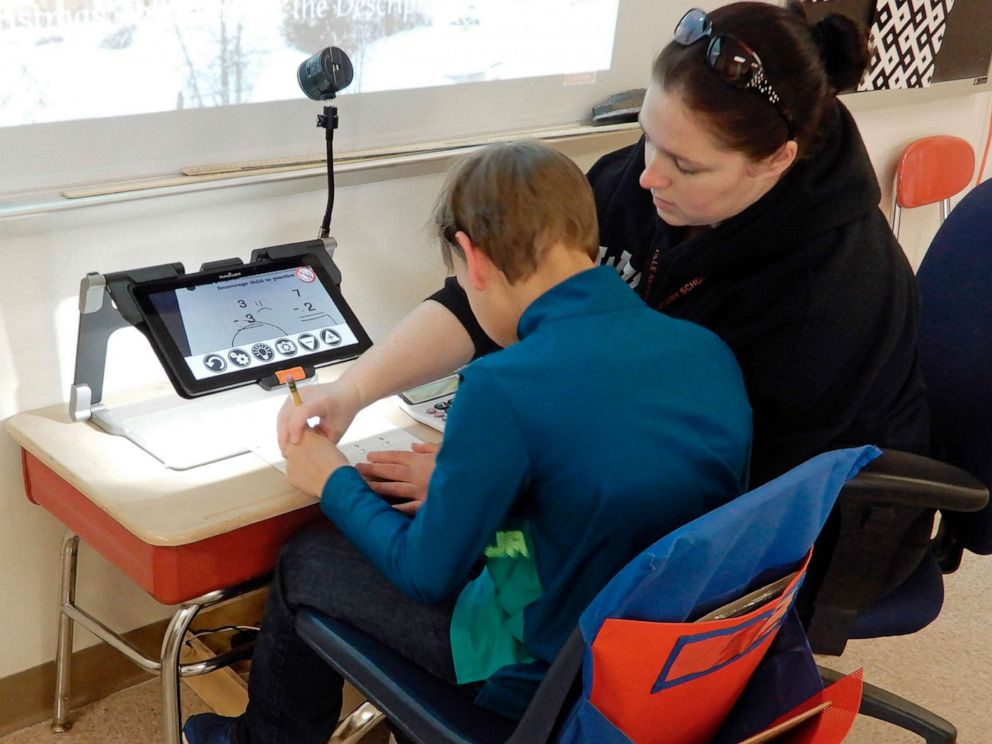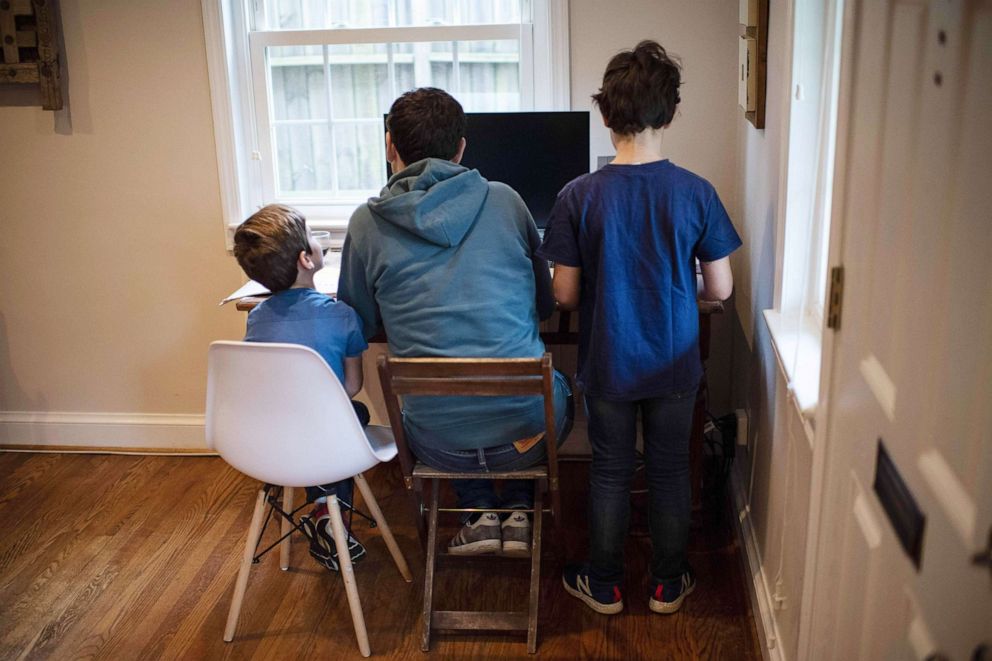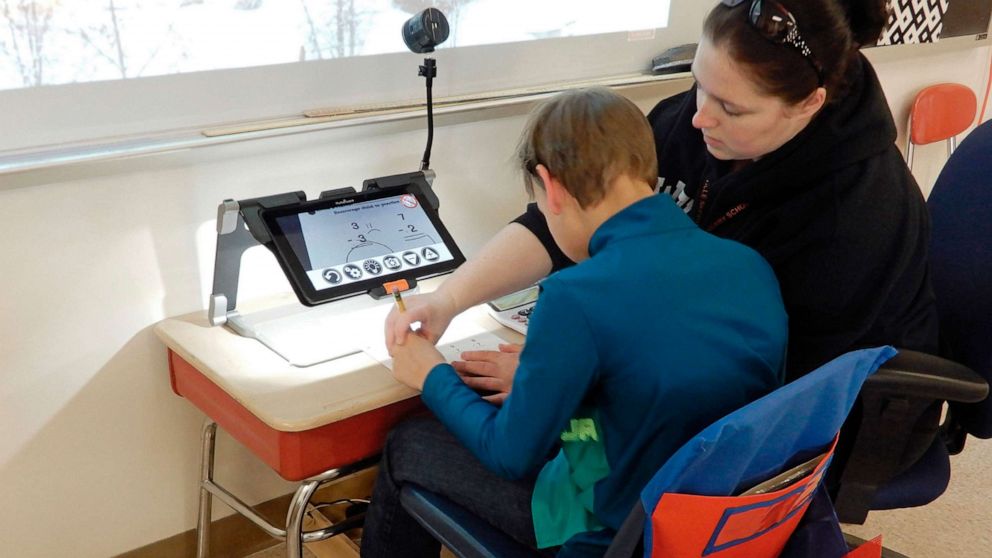Children with disabilities face additional challenges returning to school amid coronavirus
As reported COVID-19 cases continue to climb in the U.S., Chicago-based parents Margaret Storey and Jonathan Heller have struggled with the decision to send their daughter, Josie, who's disabled, back to school. Josie, 16, was born with Aicardi Syndrome, a rare neurological disorder that left her unable to walk or talk.
And while the decision to send children back to school weighs heavily on all parents, families of children with intellectual, physical and developmental disabilities are facing unique challenges and considerations.
"There's a lot of general information out there about return-to-school, but often when children have medical problems, families hear that information and think -- 'How does that apply to my kid?'" Dr. Carolyn Foster, an assistant professor of pediatrics at Lurie Children's Hospital of Chicago, told ABC News.
"This is an individualized decision for each family that depends on a child's medical conditions, but also the circumstances of the family," Foster said. "Even two children who on paper have the same medical condition, depending on the family circumstances, may have to plan differently."
While some children with disabilities likely would benefit from going back to school, others like Josie may have a harder time doing so safely.

"There is a lot of complexity involved with her daily care," said Storey, a professor and associate dean at DePaul University, who also advocates for children with medical complexities and disabilities. "We confront the challenges that I think many families like ours do, which come with needing to rely on other people to help you care for your child."
Luckily for Josie, her family is able to offer a lot of support. Because her parents' jobs allow them to work from home, Josie won't be returning to school this fall. She's on the Home-Based Services Waiver through Illinois Medicaid, which provides a range of supportive services from counseling and training of unpaid caregivers to technology and equipment provisions. This school year, an in-home caregiver will be leading Josie's remote learning four days per week, and Storey plans to manage a fifth day.
"We're very fortunate to make that choice, and a lot of families are not in that position," Storey said.
Josie still faces challenges.
"She's just devastated to be away from her friends -- she loves to go to school," Storey said. "What we have tended to prioritize is her physical well-being."
While Josie will be participating in teletherapy during her remote school days, Storey noted that schools often provide vital therapy for children with physical disabilities who otherwise might "lie in bed all day or sit in a chair for eight hours [at home] -- that's terrible for them."
Many children with disabilities also rely on special education teachers who are specifically trained to help children with extra needs. These children also benefit from in-person by learning to grow emotionally, develop friendships and learn coping skills.
Other parents may decide to send their children back to school, which should help their developmental health but may mean risking a COVID-19 infection. Now, researchers from Syracuse have found that people with intellectual and developmental disabilities may be at a higher risk.
According to their study, overall cases of COVID19 in children with intellectual and developmental disabilities were higher in the 0 to 17 age group compared to those without these disabilities. Although overall the risk of death associated with the virus was low for each group, Children with IDD who tested positive were over 16 times more likely to die.

Storey, a member of the school's PTA, notes that around 50% of families have elected to return to the classroom this fall at Josie's school.
In terms of practical return-to-school considerations, Storey and Foster both recommend that parents first talk with their child's pediatrician to understand what underlying conditions might be affected by a COVID-19 diagnosis -- and how to mitigate those risks.
"Pediatricians like me who care for kids with chronic conditions encourage parents to think about what we call disaster planning, and this happens to be a particular type of disaster," Foster said.
Next, Storey recommends families talk to their school to learn the degree to which the school is willing or able to meet those mitigation criteria. Some schools will be better equipped than others.
"Many families really rely on services that they get at school," said Foster, adding that pediatricians may be able to help facilitate creative solutions, such as hosting therapy at alternate sites if the risk of attending school is too high.
The Centers for Disease Control and Prevention recommends families of children who receive speech, occupational or physical therapy, or other related services at school to familiarize themselves with how these services will continue during in-person return to school or virtual learning.
"Keep a paper trail of how you've tried to contact the school, who you've contacted and when you've contacted them to build your case for your child's Individual Education Plan," Foster explained. "If you're having trouble getting in contact with your school, don't be shy to ask your pediatrician to join in, particularly if there are a lot of medical details that might come up as questions from your school." Social workers, if available, are another helpful resource for advocating for a child with special needs.
When it comes to receiving medical treatments at school, Foster explained that therapies such as breathing treatments may be safely transitioned to alternatives to decrease the risk of spreading COVID-19 through aerosolized particles around caregivers and classmates.
And, Foster urged, everyone at schools should wear a mask "for the sake of kids who can't" because of their disabilities.
The Child Neurology Foundation provides helpful mask tips for children with sensory-processing disorders. For children with anatomic limitations to masks, such as a tracheostomy or craniofacial differences, Foster encourages families to discuss creative solutions with their subspecialists.
Storey encourages parents of children with disabilities to reach out to patient advocacy groups within their child's disease, which can provide excellent resources. The Child Neurology Foundation has been creating webinars and videos considering a broad spectrum of children with diverse neurological conditions, such as how to discuss options with schools.
Molly Stout, M.D., a dermatology resident at Northwestern in Chicago, is a contributor to the ABC News Medical Unit.




